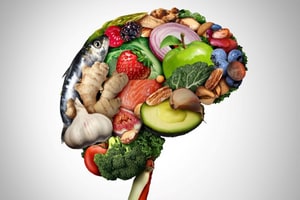Eating for Mental Health
 Have we ever taken a moment to reflect on the fact that what we eat does not just affect our physical health, it can also affect our mental health and wellbeing! The relationship between our diet and our mental health is complex, but there is a link between what we eat and how we feel.
Have we ever taken a moment to reflect on the fact that what we eat does not just affect our physical health, it can also affect our mental health and wellbeing! The relationship between our diet and our mental health is complex, but there is a link between what we eat and how we feel.
You don’t have to make big changes to your diet, but see if you can incorporate any of these tips to improve our mental health and wellbeing:
- Eat regularly: This can stop your blood sugar level dropping, which can make you feel tired and irritable.
- Stay hydrated: Even mild dehydration can affect your mood, energy level and ability to concentrate.
- Eat the right balance of fats: Your brain needs healthy fats to keep working well. They are found in things such as olive oil, rapeseed oil, nuts, seeds, oily fish, avocados, milk and eggs. Avoid trans fats - often found in processed or packaged foods - as they can be bad for your mood and your heart health.
- Include more wholegrains, fruits and vegetables in your diet: They contain the vitamins and minerals your brain and body need to stay well.
- Include some protein with every meal: It contains an amino acid that your brain uses to help regulate your mood.
- Look after your gut health: Your gut can reflect how you're feeling. If you're stressed, it can speed up or slow down. Healthy food for your gut includes fruit, vegetables, beans and probiotics.
- Sharing meals with other people: This gives us a sense of rhythm and regularity in our lives, a chance to reflect on the day, and feel connected to others. Talking and listening also slows us down so we don’t eat too fast.
- Practice mindful eating: Paying attention to how you feel when you eat, and what you eat, is one of the first steps in making sure you’re getting well-balanced meals and snacks.
Photo: ©iStock.com/wildpixel
Source: https://www.mentalhealth.org.uk/a-to-z/d/diet-and-mental-health